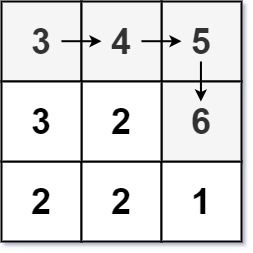Welcome to Subscribe On Youtube
329. Longest Increasing Path in a Matrix
Description
Given an m x n integers matrix, return the length of the longest increasing path in matrix.
From each cell, you can either move in four directions: left, right, up, or down. You may not move diagonally or move outside the boundary (i.e., wrap-around is not allowed).
Example 1:

Input: matrix = [[9,9,4],[6,6,8],[2,1,1]]
Output: 4
Explanation: The longest increasing path is [1, 2, 6, 9].
Example 2:

Input: matrix = [[3,4,5],[3,2,6],[2,2,1]]
Output: 4
Explanation: The longest increasing path is [3, 4, 5, 6]. Moving diagonally is not allowed.
Example 3:
Input: matrix = [[1]] Output: 1
Constraints:
m == matrix.lengthn == matrix[i].length1 <= m, n <= 2000 <= matrix[i][j] <= 231 - 1
Solutions
-
class Solution { private int m; private int n; private int[][] matrix; private int[][] f; public int longestIncreasingPath(int[][] matrix) { m = matrix.length; n = matrix[0].length; f = new int[m][n]; this.matrix = matrix; int ans = 0; for (int i = 0; i < m; ++i) { for (int j = 0; j < n; ++j) { ans = Math.max(ans, dfs(i, j)); } } return ans; } private int dfs(int i, int j) { if (f[i][j] != 0) { return f[i][j]; } int[] dirs = {-1, 0, 1, 0, -1}; for (int k = 0; k < 4; ++k) { int x = i + dirs[k]; int y = j + dirs[k + 1]; if (x >= 0 && x < m && y >= 0 && y < n && matrix[x][y] > matrix[i][j]) { f[i][j] = Math.max(f[i][j], dfs(x, y)); } } return ++f[i][j]; } } -
class Solution { public: int longestIncreasingPath(vector<vector<int>>& matrix) { int m = matrix.size(), n = matrix[0].size(); int f[m][n]; memset(f, 0, sizeof(f)); int ans = 0; int dirs[5] = {-1, 0, 1, 0, -1}; function<int(int, int)> dfs = [&](int i, int j) -> int { if (f[i][j]) { return f[i][j]; } for (int k = 0; k < 4; ++k) { int x = i + dirs[k], y = j + dirs[k + 1]; if (x >= 0 && x < m && y >= 0 && y < n && matrix[x][y] > matrix[i][j]) { f[i][j] = max(f[i][j], dfs(x, y)); } } return ++f[i][j]; }; for (int i = 0; i < m; ++i) { for (int j = 0; j < n; ++j) { ans = max(ans, dfs(i, j)); } } return ans; } }; -
class Solution: def longestIncreasingPath(self, matrix: List[List[int]]) -> int: @cache def dfs(i: int, j: int) -> int: ans = 0 for a, b in pairwise((-1, 0, 1, 0, -1)): x, y = i + a, j + b if 0 <= x < m and 0 <= y < n and matrix[x][y] > matrix[i][j]: ans = max(ans, dfs(x, y)) return ans + 1 m, n = len(matrix), len(matrix[0]) return max(dfs(i, j) for i in range(m) for j in range(n)) -
func longestIncreasingPath(matrix [][]int) (ans int) { m, n := len(matrix), len(matrix[0]) f := make([][]int, m) for i := range f { f[i] = make([]int, n) } dirs := [5]int{-1, 0, 1, 0, -1} var dfs func(i, j int) int dfs = func(i, j int) int { if f[i][j] != 0 { return f[i][j] } for k := 0; k < 4; k++ { x, y := i+dirs[k], j+dirs[k+1] if 0 <= x && x < m && 0 <= y && y < n && matrix[x][y] > matrix[i][j] { f[i][j] = max(f[i][j], dfs(x, y)) } } f[i][j]++ return f[i][j] } for i := 0; i < m; i++ { for j := 0; j < n; j++ { ans = max(ans, dfs(i, j)) } } return } -
function longestIncreasingPath(matrix: number[][]): number { const m = matrix.length; const n = matrix[0].length; const f: number[][] = Array(m) .fill(0) .map(() => Array(n).fill(0)); const dirs = [-1, 0, 1, 0, -1]; const dfs = (i: number, j: number): number => { if (f[i][j] > 0) { return f[i][j]; } for (let k = 0; k < 4; ++k) { const x = i + dirs[k]; const y = j + dirs[k + 1]; if (x >= 0 && x < m && y >= 0 && y < n && matrix[x][y] > matrix[i][j]) { f[i][j] = Math.max(f[i][j], dfs(x, y)); } } return ++f[i][j]; }; let ans = 0; for (let i = 0; i < m; ++i) { for (let j = 0; j < n; ++j) { ans = Math.max(ans, dfs(i, j)); } } return ans; }